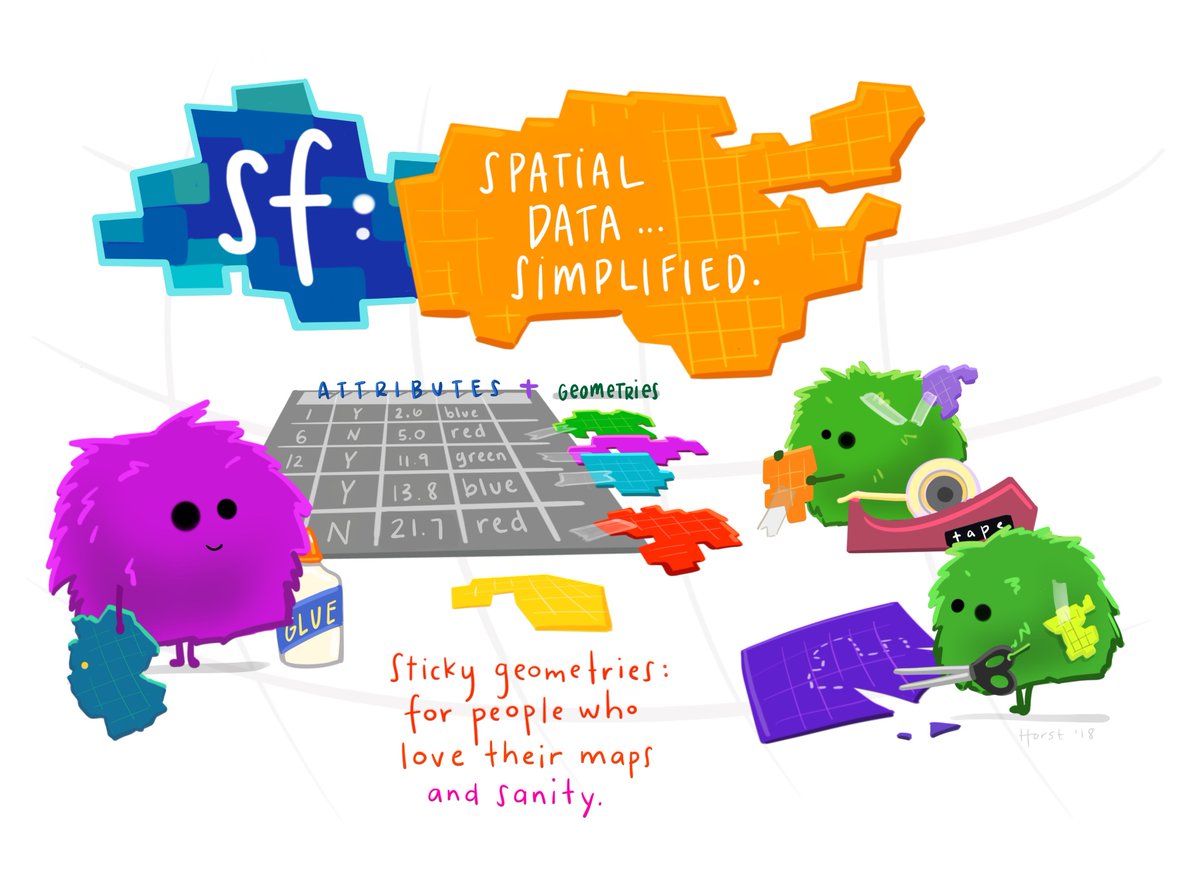A package that provides simple features access for R. Package sf:
- simple features are
data.framesortibbleswith a geometry list-column - represents natively in R all 17 simple feature types for all dimensions (XY, XYZ, XYM, XYZM)
- interfaces to GEOS to support the DE9-IM
- interfaces to GDAL, supporting all driver options, Date and DateTime (
POSIXct) columns, and coordinate reference system transformations through PROJ - uses well-known-binary serialisations written in C++/Rcpp for fast I/O with GDAL and GEOS
- directly reads from and writes to spatial databases such as PostGIS using DBI
- is extended by pkg lwgeom for further liblwgeom/PostGIS functions, including spherical geometry functions
(Illustration (c) by Allison Horst)
- package vignettes: first, second, third, forth, fifth, sixth
- blog posts: first, second, third, fourth
- the original R Consortium ISC proposal, the R Consortium blog post
- presentations: rstudio::conf 2018 (video), UseR! 2016
- wiki page describing sp-sf migration
Install either from CRAN with:
install.packages("sf")this will install binary packages on Windows and MacOS, unless you configured R such that it tries to install source packages; in that case, see below.
Install development versions from github with
library(devtools)
install_github("r-spatial/sf")Installing sf from source works under windows when Rtools is installed. This downloads the system requirements from rwinlib.
One way to install the dependencies is using sudo; the other is using homebrew.
Homebrew commands might be:
brew unlink gdal
brew tap osgeo/osgeo4mac && brew tap --repair
brew install proj
brew install geos
brew install udunits
brew install gdal2 --with-armadillo --with-complete --with-libkml --with-unsupported
brew link --force gdal2
after that, you might be able to install sf as a source package.
For MacOS Sierra, see these instruction, using kyngchaos frameworks.
For Unix-alikes, GDAL (>= 2.0.0), GEOS (>= 3.3.0) and Proj.4 (>= 4.8.0) are required.
To install the dependencies on Ubuntu, either add ubuntugis-unstable to the package repositories:
sudo add-apt-repository ppa:ubuntugis/ubuntugis-unstable
sudo apt-get update
sudo apt-get install libudunits2-dev libgdal-dev libgeos-dev libproj-dev or install dependencies from source; see e.g. an older travis config file for hints.
The following command installs all required dependencies:
sudo dnf install gdal-devel proj-devel proj-epsg proj-nad geos-devel udunits2-develGet gdal, proj and geos from the main repos and udunits from the AUR:
pacman -S gdal proj geos
pacaur/yaourt/whatever -S udunits
To install on Debian, the rocker geospatial Dockerfiles may be helpful. Ubuntu Dockerfiles are found here.
In case you use dynamic linking (installation from source) and have multiple versions of these libraries installed (e.g. one from ubuntugis-unstable, another installed from source in /usr/local/lib) then this will in general not work, even when setting LD_LIBRARY_PATH manually. See here for the reason why.
Functions and methods that require liblwgeom, including st_make_valid and all spherical or ellipsoidal metrics (area, distances), have since sf 0.5-5 been moved to their own package, lwgeom, which is also on CRAN.
- Contributions of all sorts are most welcome, issues and pull requests are the preferred ways of sharing them.
- When contributing pull requests, please adhere to the package style (in package code use
=rather than<-; don't change indentation; tab stops of 4 spaces are preferred) - This project is released with a Contributor Code of Conduct. By participating in this project you agree to abide by its terms.
This project gratefully acknowledges financial support from the





